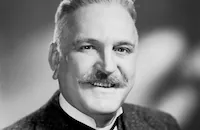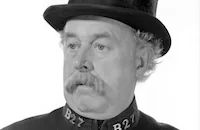Escapade
Cast & Crew
Robert Z. Leonard
William Powell
Luise Rainer
Frank Morgan
Virginia Bruce
Reginald Owen
Film Details
Technical Specs

Synopsis
In turn-of-the-century Vienna, Anita Keller, the fiancée of orchestra conductor Paul Harrandt, wins a chinchilla muff and a scarf in a raffle held at a social event. Later, Anita's sister Gerta wears Anita's new furs and sneaks out of a ball in order to pose for the famous Viennese artist Fritz Heideneck. When Fritz's portrait of Gerta, in which she appears clad only in the muff, is printed in a local newspaper with Anita's name attached, a scandal results. Though the face of the woman in the picture is hidden behind a mask, people soon begin to suspect that Anita and Fritz are having an affair. Fritz, who is as famous for his philandering as he is for his art, has indeed been carrying on a secret affair with Anita, who has promised to leave her fiancé for him. When Paul's brother Karl discovers the picture, he immediately suspects an impropriety on the part of his soon-to-be sister-in-law, and insists that Paul investigate the matter. Though Paul does not believe that Anita is the pictured model, he goes to Fritz's in order to satisfy his brother's demand. There, the artist confirms that Anita had no part in the partially nude pose, but refuses to tell him who his model actually was. Paul believes Fritz, and asks him to invent a fake name for his model to put an end to Karl's suspicions. They agree on the name Leopoldine Major, whose name they find in the city directory. When the newspapers reveal the name of the model, however, the real Leopoldine, an attendant to the Countess Feldon, is shocked. Paul, on the pretext of delivering an invitation to a Philharmonic Society party to the countess, visits Leopoldine, but his attempt to explain the situation is thwarted by the countess, who, upon receiving the invitation, insists that Leopoldine attend the event in her stead. Karl's suspicions about Anita's amoral character are only heightened when he sees Leopoldine in person at the ball and realizes that her body does not resemble the one in the picture. Meanwhile, Anita learns about Karl's suspicions and tells him that the only way he can receive her forgiveness for such an accusation is to procure a new picture from Fritz of the model, unmasked. Meanwhile, Fritz, who has fallen in love with Leopoldine, refuses to involve her in any further schemes, and rejects Karl's request to draw her. When the cab driver who took Gerta to Fritz' on the fateful night swears to Karl that it was Gerta and not Anita in his cab, Karl tries to prevent any further scandals by paying him off. Anita, however, learns of Fritz' affair with Leopoldine, and before Karl can stop her, tells a party of women of the scandal without naming the individuals involved. Leopolidine drops her serving tray in shock when she overhears Anita's story. Before attending a concert, the jealous Anita shoots Fritz, and when Leopoldine finds him hemorrhaging, she rushes to the opera house to fetch Karl, the only doctor who can treat Fritz secretly. Though reluctant to help the man who compromised his wife, Karl successfully resuscitates Fritz, and then returns to the opera house, where he places the gun that Anita carelessly left behind at the scene of the crime in her purse to save her from incrimination.

Director

Robert Z. Leonard
Cast

William Powell

Luise Rainer

Frank Morgan

Virginia Bruce

Reginald Owen

Mady Christians

Laura Hope Crews

Henry Travers
Mathilda Comont
Charles Chrysler
Michael S. Visaroff
Will Stanton
William (billy) Gilbert

Bess Flowers
Jean Fenwick
Vessie Farrell
Monya Andre
Lita Chevret

Mary Maclaren
Scott Mattraw
Lilyan Irene
Mahlon Hamilton
Tom Ricketts
Charles Requa
Crew
Harold Adamson
Harold Baldwin
Victor Baravalle
Ethel Borden
James Brock
Cedric Gibbons
Ernest Haller
Fenton Hamilton
Tom Held
Hugh Hunt
Walter Jurmann
Walter Jurmann
Gus Kahn
Bronislaw Kaper
Bronislaw Kaper
Freddie Lane
Thomas Long
Herman J. Mankiewicz
Al Roberts
Harry Sharrock
Douglas Shearer
Dolly Tree
Edwin B. Willis
Joseph Wright

Film Details
Technical Specs

Quotes
Trivia
William Powell was so impressed with Luise Rainer that he insisted that she be given co-billing with him above the title.
Notes
Working titles for this film were Masquerade, You're All I Need and Gentlemen Never Tell. The following sentence appeared onscreen following the opening credits: "The voice of the immortal [Enrico] Caruso recorded on Victor records." According to Hollywood Reporter pre-production news items, M-G-M paid $100,000 for the American rights to the Austrian film Maskerade and originally intended to produce it as a Helen Hayes vehicle. Hayes was replaced by Myrna Loy in March 1935, but two weeks after Escapade went into production, Hollywood Reporter reported that Loy and M-G-M were arguing over her "contractual status." Loy stated that she "felt herself miscast," and after a dispute with the studio, she was released from the production at her own request. The New York Times reported that Loy felt that her role of the "sobbing and giggling girl" did not suit her, and refused to continue. Loy was immediately replaced by Austrian actress Luise Rainer, who made her Hollywood debut in the film. Hollywood Reporter pre-release news items and production charts list actors Lucile Watson, Scotty Matthews, Claudelle Kaye, Edwards Davis, Antoinette Lees and Lorraine Bridges in the cast, but their appearance in the released film has not been confirmed.
According to information contained in the file for the film in the MPAA/PCA Collection at the AMPAS Library, the PCA urged that care be taken in dealing with "the situation of a wife who poses in a somewhat scanty costume, without her husband's knowledge." The PCA file also indicates that the Belgian censors approved the film only for adult audiences, and stated that "the conjugal and extra-conjugal relations are not suitable for children." In addition, censors in Australia, Vienna, Quebec, Pennsylvania, Ohio, Massachusetts, Ontario and Japan eliminated a shot of a corset and other women's clothes strewn about a room. Japan also deleted a shot of doors featuring a decoration resembling the Japanese Imperial Chrysanthemum. Many censors also eliminated the line of dialogue: "A woman in that condition should be seen by two men only; her husband and her doctor, and I am both."
A December 1935 Hollywood Reporter news item notes that M-G-M purchased the rights to the Austrian film Episode, the sequel to Maskerade, and planned to remake it either in Hollywood or in London under Ben Goetz's supervision. M-G-M never produced Episode, but Warner Bros. made it in 1940 under the title My Love Came Back (see below).












